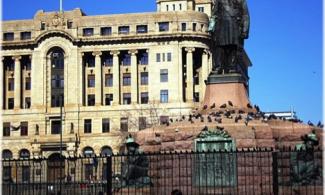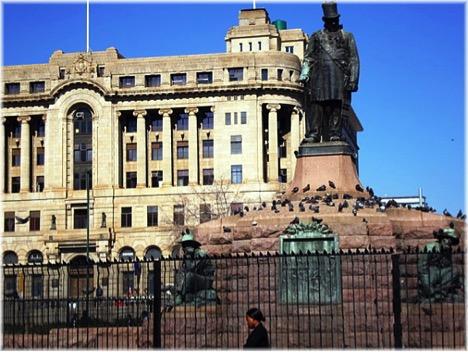
Tensions rise to the rafters in South Africa where Nelson Mandela’s ANC party never once faced such a darkly ominous election under a cloud of suspicion as a party more likely to wreck the future of the country with corruption than build it.
“This election is not about anyone who was jailed on Robben Island but about which political party can assure a better future for South African families,” the Leader of United Democratic Movement Party (UDM), Bantu Holomisa, said in sweaty earnest to a sparse audience at his party’s final campaign rally in the Eastern Cape on Sunday 31st July.
Polls opened at 8.00am (Monday) but only for 53,000 disabled voters, and later on Wednesday, the 1,586 polling booths will open for all registered voters in South Africa who will have 202 political parties to choose from, if they wish to vote against Nelson Mandela’s ANC party whose notable apparatchiks - including the country’s President Jacob Zuma – were lately caught pilfering government funds by tricks.
“Who has ever thought that a liberated South Africa would be led by a questionable character like himself [Jacob Zuma] who lavishly and exclusively spends taxpayers’ monies without having any regrets, thereby superseding the negative conduct of former Apartheid Presidents. Shockingly superseding! Bantu Holomisa said in a Press Release of 15th July.
In a beyond the pale incident by South Africa’s staid standards, the country’s Constitutional Court issued a verdict on 31st March saying President Jacob Zuma virtually pocketed public funds under the ruse of ‘security upgrades’ for his private home in Nkandla, KwaZulu Natal. The physical inspection revealed that what President Zuma officially entered as expenses for ‘security upgrades’ on that house actually included a private swimming pool, a cattle kraal and a chickens-run.
President Zuma was thus ordered by the court to pay US personally $541,000 back to the treasury within 45 days, counting from the 27th of July. It never rains, but it pours. For in a related verdict, another criminal charge sheet of 700 plus criminal counts, against President Jacob Zuma, was also ordered by another High Court to be re-filed and prosecuted in a court of law without delay. It is with that criminal stain all over it that ANC goes into this week’s nationwide municipal election.
“President Zuma has put Nelson Mandela on trial, more or less,” a White South African shop-owner inside Northgate Shopping Centre in Randburg wryly said. “With 66% more political parties to choose from than we had in the last 2011 election, and with over 200 parties registered to contest this election, we doubt if ANC can win 50%+ of the popular votes, this time, to retain control of the local governments in the prized metros of Johannesburg, Tshwane, and, Nelson Mandela Bay,” - the three battleground cities out of the seven metros at play in this dicey election.
Whereas, by contrast, the ANC had easily won 70% of the votes in the third largest province - Free State – and further won 62% of the votes cast across all other provinces in South Africa at the last municipal election held in the year 2011.
For this week’s election there are only “914 seats available for 7 869 candidates” said Courtney Sampson, a Provincial Electoral Officer. The ruling ANC party now has its work cut out. To prevail, ANC must win the highest number of votes, which looks certain - as the only party with nationwide ward level organization in all the rural areas where a majority of the 202 rival political parties barely exist. But even if ANC wins the highest number of votes, it must then win the prized metros - excepting the Cape Town metro which is the stronghold of opposition Democratic Alliance Party (DA) party - but including the country’s capital city metro of Tshwane, which now looks unlikely.
In the last election in 2011, Tshwane, the capital city, was almost a toss-up, as the ANC was level-pegging with the opposition in the opinion poll on the lead-up and until the last days when ANC only luckily nosed ahead to win Tshwane by 55% of the votes, whilst the major opposition party –Democratic Alliance – won 38% of the votes.
In mid-June, riots flared in Tshwane when ANC announced a former cabinet Minister, Thoko Didiza, a former Works Minister, as the party’s candidate for the Tshwane mayoral seat. ANC Youths went on rampage instantly. The irate youths burnt 46 luxurious inter-city buses in a single day and looted several shops in the city, mostly owned by foreign residents.
Their grievance was that Thoko Didiza is not a native of Tshwane and should not be imposed on the people. APC Executive committee gave that grievance but short shrift as merely tribal objection and retained Didiza in the belief that her previous national political status should dwarf that of a local politician the opposition Democratic Alliance [DA] is fielding in Tshwane. But it is not obvious after the riots if the angry Tshwane youths would now vote this week for a non-native Thoko Didiza whom the ANC imposed as party candidate.
The infighting inside the ANC over its imposed candidates in several municipalities has been costly. No fewer than 13 ANC members and candidates for this election were found shot dead on the streets in the past six weeks, majorly in the north-eastern province of KwaZulu Natal where the rival Inkatha Freedom Party [IFP], led by Mangosuthu Buthelezi, had won six of the province municipalities at the last election, including embarrassingly, the municipality of President Jacob Zuma’s own Nkandla homeland in a 2012 re-run election.
That’s why this week in KwaZulu Natal the ANC will find it hard-going. Buthelezi’s IFP has been campaigning to his Zulu kin and kith to reject President Zuma on the basis of the court verdict finding President Zuma liable for financial fraud. ANC’s main alliance partner in the province – National Freedom Party – is also embroiled in internal leadership tussle and was last week barred by the Electoral Court in South Africa from contesting this week’s election because NFP did not pay up its participation fee to the Electoral Commission within the deadline given to all political parties.
Sensing that political vacuum in Natal province, on the back of NFP’s disqualification, the main opposition - the Democratic Alliance [DA] - quickly stepped into the breach and ramped up its campaigns in Natal with intent to win the Nkandla homeland seat of President Zuma, at the least, if only for bragging rights, since the DA knows it cannot defeat the Zulu-led IFP in all of Natal, which historically is the IFP’s tribal home.
But already, Sophie Buthelezi, the National Freedom Party (NFP) councillor in Nkandla has cross-carpeted to stand in this election as the DA candidate, in a major boost for DA’s slim chances.
“The elections have been rigged in advance,” the IFP Leader Buthelezi fumed last week in reaction to a freak incident in Gauteng province where a busload of ballot papers was forcefully intercepted by unknown gunmen near Soweto and stolen away. The Independent Electoral Commission promptly assured the sceptical public that those stolen ballot papers shall be electronically invalidated since they are numbered. Few people think so.
Meanwhile, the Democratic Alliance [DA] party which won 16% of the votes nationwide at the last general election to overtake all other parties as the leading opposition party in South Africa today, is expected to improve its standing by four percentage points in this election; possibly by winning the Tshwane metro through protest votes, along with the Nelson Mandela Bay metro in the Eastern Cape, where the ANC incumbency is beset by internal squabbles, according to the Ipsos’ public opinion poll which projects 30% overall decrease in ANC votes in the Gauteng province; matched by similar decrease in Tshwane - the capital city, plus another 27% vote loss for ANC in Nelson Mandela Bay metro.
Tellingly though, DA’s white Afrikaner base is still a red flag deterring mass black followership to deny it a chance of winning the overall majority in this election outside South Africa’s main commercial cities. ANC party rules the roost in rural areas. Black South Africans are themselves wary to vote DA party in the fear it would be tantamount to voting for a return of apartheid since the same white South Africans form the support base of the DA party, along with majority Malay (coloured) descendants in the Western Cape Province.
Notwithstanding better governance ability result that the DA party tries to flaunt, and despite tracing the DA party’s roots to a liberal anti-apartheid political party founded in the 1950s, and regardless that its current party chairman is a black South African fiery Pastor – Mmusi Maimane – doubts persist amongst black voters if DA is not a white supremacist party all over again.
“People can see in places where we have governed that we offer better services than any other political party. We must start a revolution in this country, not with violence or guns, but with mass votes, to take the country from the ANC which has ceased to be a competent political party,” the DA national Leader, Mmusi Maimane urged its supporters at a recent rally in Johannesburg.
The acid test of that ‘revolution’ would be the voter turn-out this week. If South Africans in the urban cities turn out less than expected, and if rural dwellers turn out more than expected, the DA party share of the total votes will fall by much. President Zuma, with 34% approval rating today, is not sitting on his hands, knowing full well that this general municipal election is as much a referendum on his leadership of the ANC as much as a public trial of Nelson Mandela’s legacy which he – as a successor – has so far failed to protect.
“ANC will rule South Africa until Jesus Christ comes back,” President Zuma said recently, to shore up support, give heart to despondent ANC members, and swat off cutting criticisms of theft and incompetence dogging his fumbling regime – a reason President Zuma was cited for impeachment in the national Parliament this April, but had escaped removal from office with the en bloc majority votes cast to save his job by ANC-parliamentarians and alliance partners.
All said, the wild card in this week’s election is the Julius Malema led Economic Freedom Fighters Party [EFF] which came third in the last general election, winning just about 6% of the total votes cast nationwide. Since that last election, however, the EFF has grown in people’s consciousness for its flame-grilled rhetoric and for demagoguing public frustrations with the ANC’s ineffective land reform program of ‘willing-seller-willing-buyer’ which has resulted so far in just about 20 million acres of the lands held by white South Africans being returned to the original black owners.
The EFF instead raises the spectre of violent revolution, more in jest, by threatening Zimbabwe-type invasion of the remainder white lands for seizure and for re-distribution to dis-possessed majority black populace. For all that, and for projecting himself in Parliament as President Zuma’s most acidic critic, Julius Malema draws crowds especially in his hometown province of Limpopo in the northernmost region of South Africa, bordering Zimbabwe.
Julius Malema could well cut down ANC’s hold on Limpopo province, if not defeat the ANC there outright. Julius Malema was the ANC Youth Leader but he was expelled from the ANC three years ago for indiscipline. His expulsion from ANC in 2013 could now come to haunt the bigwigs in the ANC this week after Limpopo votes are counted.
-Seyi Olu Awofeso is a Legal Practitioner in Nigeria.
